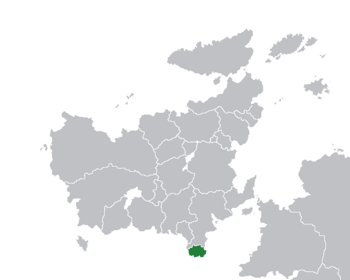Austerian People's Republic
| 1947–1990 | |||||||||
| Motto: Qytetarët bashkohuni! "Citizens unite!" | |||||||||
| Anthem: The Internationale | |||||||||
 Location of the Austerian People's Republic (green) in Euclea (light grey) | |||||||||
| Capital | Kartha | ||||||||
| Official languages | None | ||||||||
| Recognised national languages | Tethian Montesurian Novalian Piraean | ||||||||
| Religion | State atheism | ||||||||
| Demonym(s) | Austerian | ||||||||
| Government |
| ||||||||
| First Secretary | |||||||||
• 1946-1980 | Omer Kotta | ||||||||
• 1980-1987 | Adil Majko | ||||||||
• 1987-1990 | George Simion | ||||||||
| Chairman of the Presidium | |||||||||
• 1963-1964 (first) | Marcian Zerea | ||||||||
• 1987-1990 (last) | Sotir Godo | ||||||||
| Legislature | National People's Congress | ||||||||
| Historical era | Great Game | ||||||||
| 1947 | |||||||||
| 13 January, 1947 | |||||||||
• Death of Omer Kotta | 6 August 1980 | ||||||||
| 1982-1987 | |||||||||
• Olive Revolution | 10 June 1987 | ||||||||
| 9 July 1990 | |||||||||
| Currency | Libro (Ⰾ/₤) | ||||||||
| |||||||||
The Austerian People's Republic (Tethian: Republika Popullore Austeriak), was a one-party socialist country that existed from 1947 to 1990 as the direct predecessor of the modern-day Republic of Austeria. It was established after the defeat of the Great Solarian Republic in the Solarian War by the Austerian Popular Front, led by Omer Kotta. It governed until the first free elections in 1990 led to the formal abolishment of the socialist republic. The country was bordered by the Acheloian Sea to the south and west and the Solarian Sea to the east, and Etruria to the north. The country bordered Piraea's Tarpeia region in the northwest until it was annexed by the Etrurian military dictatorship in 1962.
The Austerian People's Republic traces its origin to the formation of the Austerian Popular Front in October 1943 during the Solarian War to resist the Greater Solarian Republic. Following the war, a provisional government was briefly established until the declaration of the socialist state in February 1947. For the majority of its history, the country was ruled mainly by Omer Kotta and the Austerian Labour Party, who espoused a particularly nationalistic form of Equalism. Socialist Austeria was a close ally of the South Euclean People's Republic and cooperated on a variety of issues, such as support for the Novalian Revolutionary Front. Domestically the government aggressively promoted a common Austerian identity based upon a combination of socialist patriotism and common cultural and historical traditions. Despite officially being an atheist state, the government supported religious freedoms and the Galeneic project, although it maintained firm control over religious life in the country.
Austeria began to destablize following the death of Omer Kotta on 6 August 1980 and the Amathian Revolution a few months later which crippled the SEPR. Ethnic tensions erupted in 1983 into violent series of clashes and massacres between ethnic and sectarian paramilitaries which further grew into guerrilla warfare between rival paramilitaries and the state. The violence significantly escalated after the Novalian Revolutionary Front joined the conflict against rival paramilitaries and the Austerian government. In 1987 hardline elements of the Labour Party attempted to seize power, only to be forced out by reformist elements who entered negotiations with the support of the Euclean Community. As part of the Morwall Agreement, the government dismantled the single-party system of government and adopted a multi-party democracy. The former Labour Party won the first election and formed an interim government. The Austerian People's Republic was officially dissolved by decree by President Sotir Godo on 1 August 1990.

